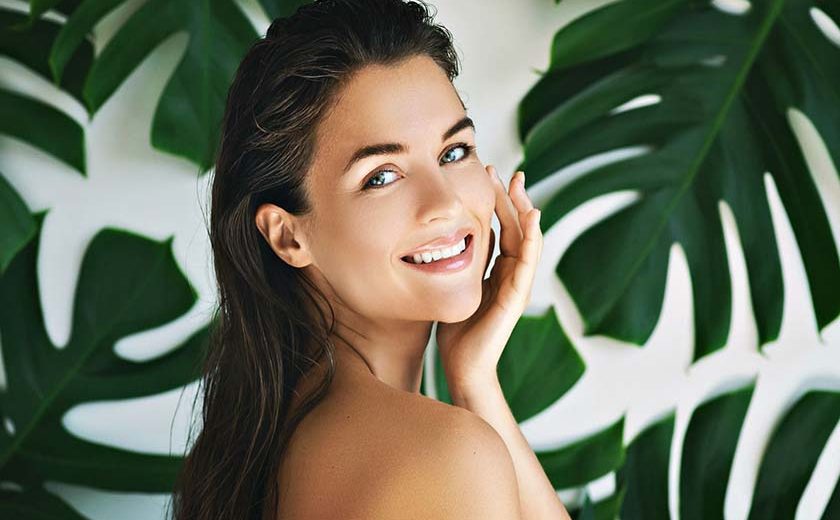Moisturising is the key component to maintaining healthy, youthful skin along with cleansing.
While cleansing removes dirt, grime, and dead skin cells, moisturising not only increases the skin’s water content, but also protects the skin and makes the skin appear smooth, giving you a fresh complexion. With the astounding number of moisturisers in the market, all claiming to have properties that no other moisturiser has, we can’t blame you for being overwhelmed. If you don’t know where to start, turn the pages for some pointers.
Do You Need A Moisturiser?
Some women wonder if they need to use moisturiser when they have oily skin.
Even if you have oily skin, you can still benefit from the use of a daily moisturiser without leaving skin feeling greasy and looking shiny. Also, if you suffer from dry skin, you definitely need moisturisers.
Moisturisers simply act by preventing natural oils and water within the skin from escaping; they do not insert moisture into the skin. It gives your skin a smooth, soft texture and, plumps up the fine wrinkles making them less obvious. The trick is in finding the right product.
Depending on ingredients used, moisturisers also:
- reduce moisture loss and increase water content of the epidermis
- form a protective barrier on the skin’s surface
- improve skin tone and texture
- give the skin a soft, smooth feel
- mask imperfections
Moisturisers simply act by preventing natural oils and water within the skin from escaping.
Moisturisers are especially important if you are using drying acne treatments such as Retin-A, Accutane or benzoyl peroxide. Using a daily moisturiser will help ease the uncomfortable dryness, peeling and flaking that can be caused by many acne medications.
So, don’t be afraid to moisturise your skin! Take the time to choose the right moisturiser by reading ingredient labels and asking your dermatologist or aesthetician for recommendations. Experiment with different products until you find the one that is perfect for you.
A Body Moisturiser Is NOT Meant For The Face!
There are some good reasons why you shouldn’t use a body moisturiser on your face. By now, you should be aware that your face is more sensitive than your body and it has special needs that the rest of your body doesn’t have. You could have sensitive skin, acne prone or even prone to fine lines and wrinkles. Many body moisturisers are also added with fragrances to give you a soft scent as well as hydration. If you continue using your body moisturiser on your face, you could wind up with more frequent breakouts and most likely, oily skin.
Often a body moisturiser’s sole function is to hydrate the body. Hence, applying a body moisturiser on your face would only aggravate the condition. Another good reason is for sun protection. Many facial moisturisers add in SPF coverage while many body moisturisers don’t.
Moisturiser For Your Skin Type
When it comes to a facial moisturiser, pick one that is meant for your skin type. Many moisturisers contain some combination of humectants and emollients, as well as other ingredients. The moisturiser that’s best for you depends on many factors, including your skin type, your age and whether you have specific conditions, such as acne. For general guidelines, consider these skin type characteristics:
- Normal skin. Normal skin is neither too dry nor too oily. To maintain this natural moisture balance, use a water-based moisturiser that has a light, non-greasy feel. These moisturisers often contain lightweight oils, such as cetyl alcohol, or silicone-derived ingredients, such as cyclomethicone.
- Dry skin. To restore moisture to dry skin, choose a heavier, oil-based moisturiser that contains ingredients such as antioxidants, grape seed oil or dimethicone, which helps keep your skin hydrated. For very dry, cracked skin, petrolatum-based products are preferable. They have more staying power than creams do and are more effective at preventing water from evaporating from your skin.
- Oily skin. Oily skin is prone to acne and breakouts. Though oily, such skin still needs moisture, especially after using skin care products that remove oils and dry out the skin. A light moisturiser can also help protect your skin after washing. Choose a water-based product that’s labeled “non-comedogenic,” which means it won’t clog pores.
- Sensitive skin. Sensitive skin is susceptible to skin irritations, redness, itching or rashes. Look for a moisturiser that contains soothing ingredients such as chamomile or aloe vera and doesn’t contain potential allergens, such as fragrances or dyes. Also, avoid products containing acids, which can irritate sensitive skin.
How To Apply Moisturiser
The regime of cleansing, toning and moisturising is a waste if you don’t know how to apply the moisturiser properly. Applying it is easy and simple, if you just keep a few pointers in your mind. Here are some simple tips to remember:
- Wash your hands and face with a mild soap or face wash. You need to apply moisturiser only when the skin is damp, to have the best effect. Immediately after you have cleansed it, apply toner. While the skin is still damp with the toner, apply the moisturiser.
- Take three pea-sized blob of the moisturiser on your hand and spread it, by rubbing the palms together. If you have difficulty in making out the right amount, you can start by placing three small dabs, evenly-spaced, in the middle of your brows.
- With an upward motion of the hand, start applying the moisturiser on your face. Use firm, but gentle hand strokes and rub the moisturiser on your face. Massage in small circles, from centre and out to the cheeks. Include the eyebrows and eyelids. Put a dab on your neck too and in an upward stroke, rub to get absorbed in the skin. Use your ring finger and middle finger for massaging the lotion.
- Don’t apply moisturiser around your eyes, as the skin around the eyes is very sensitive and may become puffy because of the moisturiser.
- The time-span of at least 10 minutes is necessary to allow the moisturiser to set in, before you actually jump in for makeup.
Get the Most Out of Your Moisturiser
- Be willing to experiment. While choosing a moisturiser, keep your skin-type in mind. Loosely, moisturisers can be divided into two categories – oil based and water based. Ask the salesperson about the one that will suit your skin best.
- Water or Oil? Moisturise with an oil-based moisturiser when skin is dry and a water-based moisturiser when oily.
- Protect yourself from the sun. Choose a moisturiser that contains sunscreen, which performs double duty by hydrating your skin and protecting it from sun damage.
- Avoid moisturiser with fragrance and preservatives. While buying the moisturiser you should keep the climate of your area in your mind too. If the humidity is very low in your area, look for a moisturiser with glycerin and mineral oil. If you live in a humid area, you may well be satisfied with just a lotion.
- You don’t have to buy the most expensive brand. Keep in mind that cost has no definite relationship to effectiveness. Just because a moisturiser is expensive doesn’t mean it’s more effective than a cheaper product.
- Apply moisturisers immediately after bathing. Pat or blot your skin until it’s just barely dry, then apply moisturiser immediately to help trap water in the surface cells.
- Apply moisturiser to your hands and body as needed. Apply after bathing or showering, before exercising outdoors in cold weather, and every time you wash your hands. Although often ignored, your hands are more exposed to the elements, especially soaps and chemicals, than is any other part of your body.
- Use heavy creams appropriately. Don’t use any heavy creams on your face unless you have excessive dryness. You can use heavy, oil-based creams on your legs, hands and feet because those areas tend to be drier.
- If can, go for a moisturiser that is made up of natural ingredients. At the same time, make sure that it has sunscreen and other important ingredients as well, to make your skin sooth and supple. Now after you have invested in a good brand and quality moisturiser, you need to know how to use it.

What About Natural or Organic Moisturisers?
A natural or organic moisturiser is one that contains no mineral oil, parabens or chemical preservatives, but is made from pure ingredients sourced from nature.
The skin is actually designed with it’s own protective layer of sebum, the natural substance secreted though our skin’s pores. Too little sebum means dry skin, too much can cause oily or greasy skin.
Sadly today, pollution and other environmental factors combined with our modern lifestyle means we have to actively protect our skin by applying a moisturiser every morning. However, this doesn’t have to cost a fortune and economical moisturisers can do as good a job as the expensive exquisitely packaged ones costing hundreds of ringgit!
What Is The Most Important Ingredient In A Moisturiser? It’s Water. Surprised?
Well the only reason we use one is to lock precious water into our skin to keep it supple and looking moist and dewy. Younger skin, unless it’s very dry looks moist and dewy most of the time. Older skin needs a good natural or organic moisturiser to help it look its best and to delay the affects of ageing. The simplest ones are made from oil and water.
Anti-ageing Moisturisers
The best anti-ageing moisturisers are those which are made of natural oils – not mineral oils. Mineral oils will not be absorbed into the skin and can actually dry the skin further. Mineral oils can also block pores and prevent the skin from eliminating toxins. Natural fruit and nut oils are a much better bet and some essential oils can be absorbed quite deep into the dermis due to their fine molecular structure.
Wheatgerm oil contains high levels of vitamin E and makes a good base as a night moisturiser for dry or ageing skin.
One ingredient best avoided for older skins is alcohol. It doesn’t matter whether you drink it or rub it on your skin, alcohol has a drying effect. If you enjoy a drink or two, make sure you drink water between drinks and don’t buy products containing alcohol even if your skin is oily. Alcohol removes the water, not the oil.
If you have oily skin you may think you don’t need to moisturise. Well you probably don’t need any more oil, but your skin still needs a protective layer and it still needs moisture. Aloe vera gel can provide this or choose a lotion that’s not based on oil. There are however, certain essential oils such as rosemary which can benefit oily skin.
What Other Ingredients Should You Look For In A Moisturiser?
There’s nothing else that’s absolutely necessary, but ingredients such as zinc oxide will provide sun protection and glycerin can be useful for attracting moisture to the skin and keeping it moist. Go for natural glycerin that is sourced from vegetable oils.
Hyaluronic acid and Sodium PCA may sound like chemicals but in fact they are powerful moisturising ingredients occurring naturally in the skin. They decline gradually as we age and are therefore good to have in a moisturiser.
However, don’t forget the best and cheapest way to maintain a dewy skin is to drink plenty of water. The skin draws water from our body and if that body is dehydrated, your skin will look drawn and parched and will wrinkle faster.
A Gentle Reminder!
If a moisturiser doesn’t improve the condition of your skin or you notice skin problems after using a moisturiser, see your doctor or dermatologist. He or she can help you create a personalised skin care plan by assessing your skin type, evaluating your skin’s condition and recommending moisturisers likely to be effective for you.
References:
About.com
Mayoclinic.com
Just-natural-skincare.com


